Key takeaways:
- Volunteer work fosters personal growth, enhancing skills like teamwork, communication, and problem-solving through hands-on experiences.
- Engaging in community service builds connections, creating a sense of solidarity and understanding among diverse groups.
- Volunteering emphasizes empathy and adaptability, essential traits for effectively addressing community needs and crisis management.
- Experiences in volunteer roles can inform real-life applications in areas such as homeland security, highlighting the impact of community support in times of crisis.
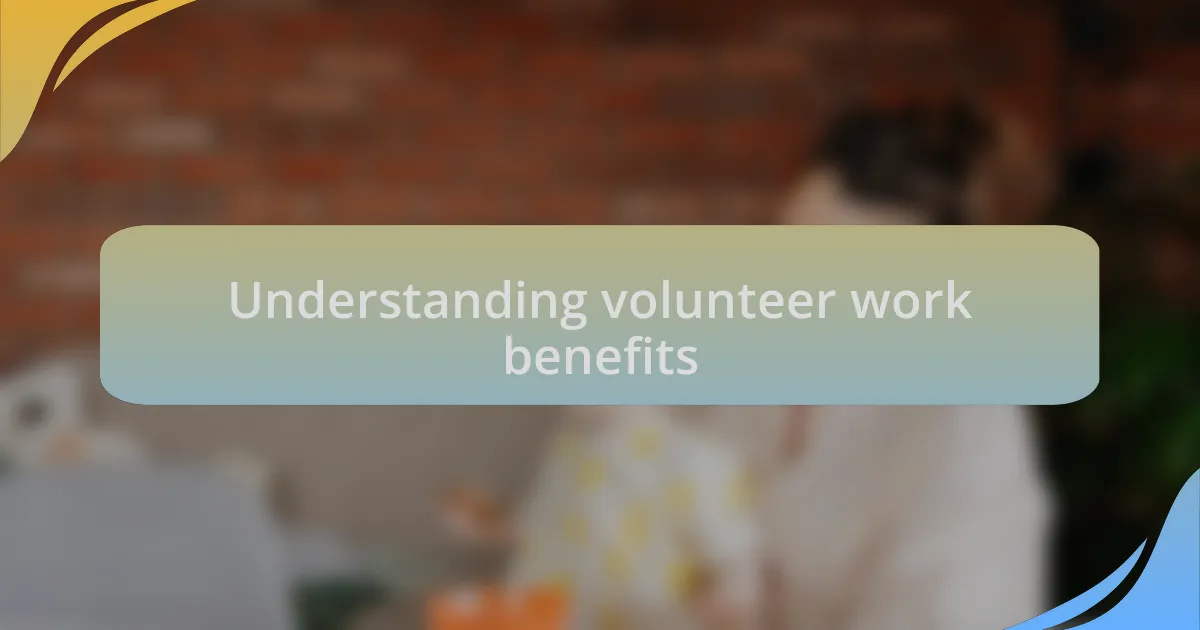
Understanding volunteer work benefits
Engaging in volunteer work offers a unique opportunity to deepen your understanding of community needs and your place within them. I recall a time when I volunteered at a local disaster relief center; witnessing the immediate impact of our efforts on people’s lives was both humbling and illuminating. Have you ever felt that strong connection to a cause, one that transforms your perspective on your own role in society?
Beyond personal growth, the benefits of volunteer work extend to developing critical skills that can enhance your professional trajectory. For instance, coordinating relief efforts during a major storm taught me invaluable teamwork and leadership skills that I still apply today. Isn’t it fascinating how experiences that seem to be solely about helping others can simultaneously advance your own abilities and confidence?
Moreover, the emotional rewards of volunteering are profound. I vividly remember the overwhelming gratitude expressed by a family we assisted; their appreciation brought a tear to my eye, highlighting the importance of human connection in times of crisis. Have you ever experienced that rush of fulfillment when you realize your efforts made a real difference? Those moments remind us that volunteer work is not just about giving – it’s also about receiving the rich rewards of community and compassion.
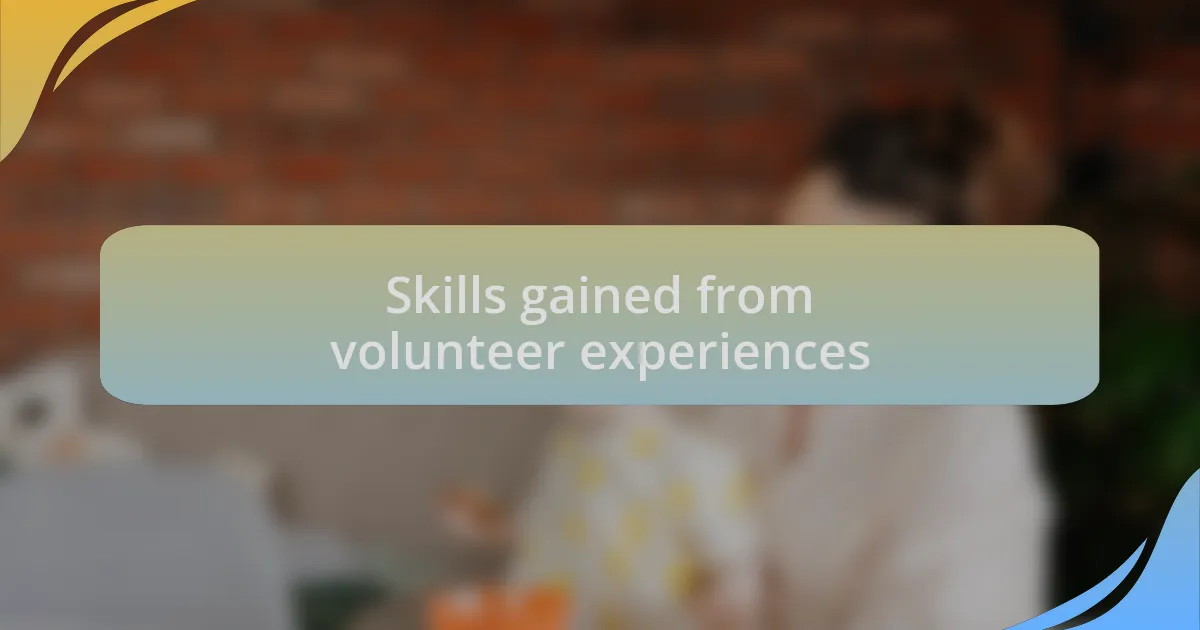
Skills gained from volunteer experiences
Engaging in volunteer work has allowed me to develop a diverse skill set that I find invaluable. For instance, while helping at a shelter, I learned how to manage logistics effectively—organizing supplies and scheduling shifts taught me a great deal about planning and resourcefulness. Have you ever found yourself in a situation where your organizational skills were put to the test? It can be stressful, but those moments teach you to think on your feet and adapt quickly.
One of the most significant skills I gained was communication. Working alongside people from various backgrounds required me to bridge gaps and foster understanding. I remember a moment when a language barrier almost derailed our efforts; however, by utilizing patience and creativity, I found ways to communicate that made all the difference. How often do we overlook the power of clear communication? In volunteer settings, it’s crucial and truly enhances our ability to work collaboratively towards a common goal.
Additionally, my time volunteering honed my problem-solving skills. During a community project, I encountered unexpected challenges that forced me to brainstorm creative solutions on the spot. I recall how we faced a sudden shortage of volunteers; instead of panicking, we rallied our team and reallocated tasks, which turned out to be an unexpected bonding experience. Have you faced a similar critical moment where improvisation led to surprising outcomes? Those instances are where I believe true growth happens, and they leave lasting impressions on how I approach challenges in all areas of life.
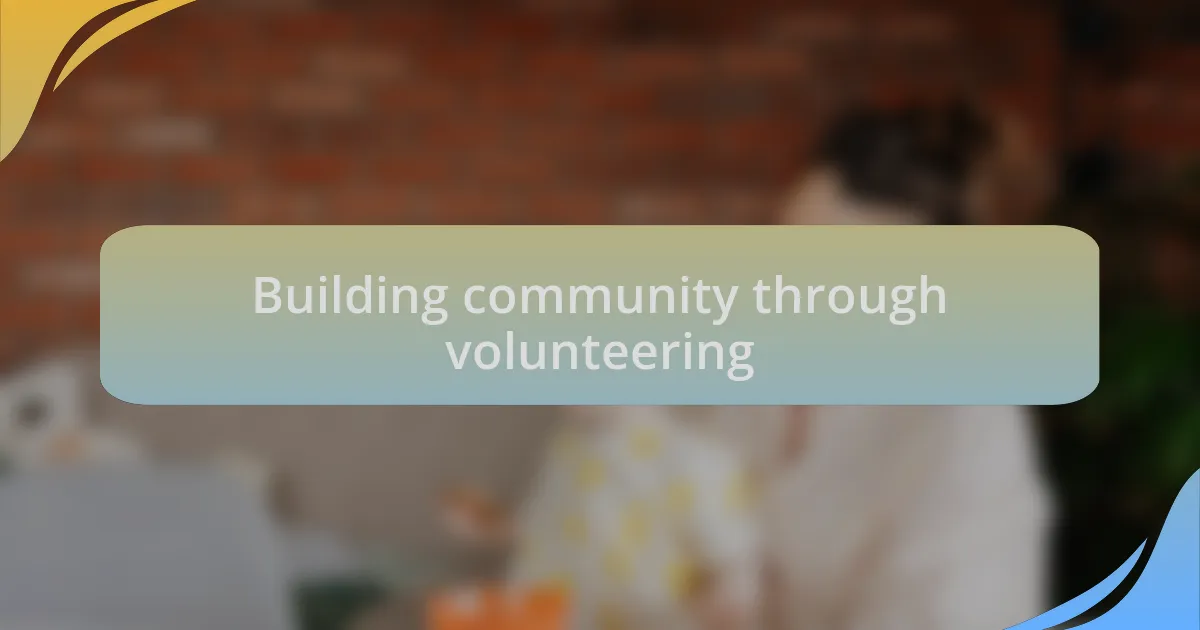
Building community through volunteering
Building community through volunteering is incredibly powerful. I remember joining a community cleanup event one weekend, and by the end, I felt a shared sense of purpose with strangers who quickly became friends. It was as if we were all part of a larger family, united for a common cause. Have you ever felt that connection when joining hands with others for a meaningful mission?
In another instance, while volunteering at a local food bank, I witnessed the unwavering spirit of solidarity among volunteers. Everyone came from different walks of life yet shared a commitment to compassion. We exchanged stories as we worked, learning about each other’s challenges and triumphs, which deepened our understanding of what true community means. Isn’t it fascinating how volunteering can open doors to understanding and empathy?
What struck me most was the ripple effect of our collective efforts. After a series of volunteer events, I noticed how neighbors began to converse more and support each other in everyday life. The simple act of coming together to serve created lasting bonds, transforming a mere gathering into a thriving community. Have you seen such changes in your own neighborhood after joining group efforts? It makes you realize that when we volunteer, we are not just giving back; we’re building a resilient community that thrives on connection and care.
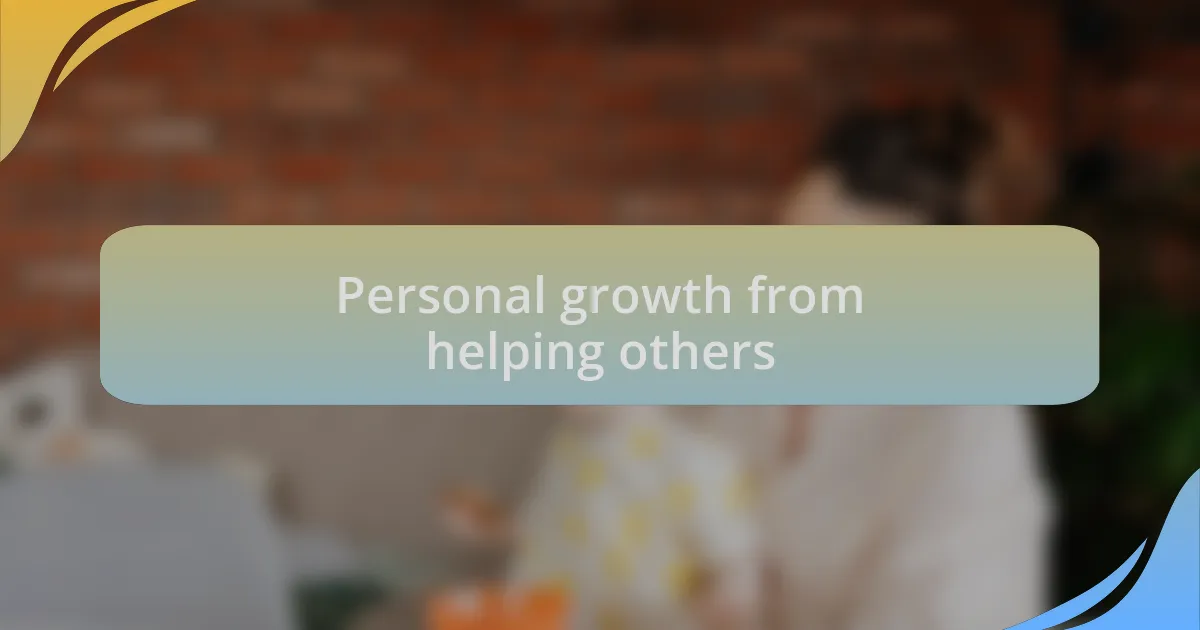
Personal growth from helping others
Helping others has a remarkable way of shifting our perspectives. I recall volunteering at a shelter where, initially, I felt hesitant and out of place. However, as I engaged with the individuals there, I discovered resilience in their stories that challenged my own worries. Have you ever been surprised by how much strength others can exhibit, inspiring you to rise above your challenges?
There’s a profound sense of humility that comes from serving those in need. One afternoon, I was sorting clothes when I found a note tucked in one of the pockets. It was a heartfelt message from a donor, describing why they wanted to give. That simple interaction reminded me that every small act of kindness has a ripple effect. Have you found moments like this in your own experience where a small gesture transformed your understanding of generosity?
As I continued my volunteer work, my self-perception began to shift. I used to view myself as just an individual navigating life’s obstacles, but now, I recognize my ability to impact others positively. Even small conversations can create understanding and change perspectives. Isn’t it empowering to realize that through our actions, we can become part of someone else’s journey toward hope and healing? Each experience has nudged me toward becoming a more compassionate and open-minded individual.
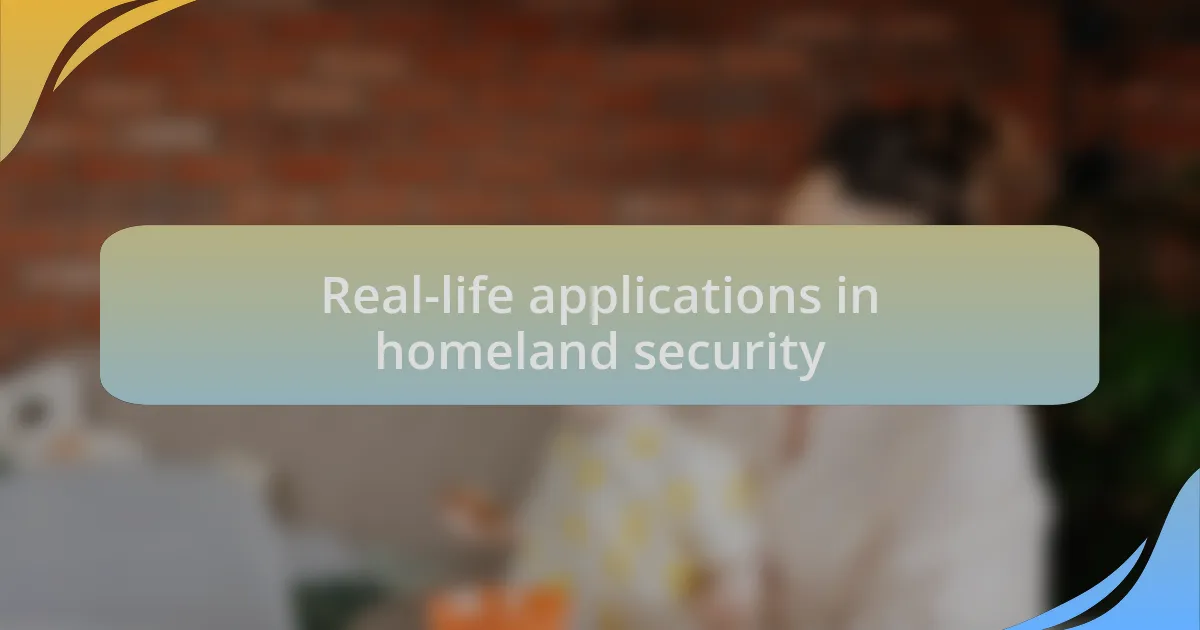
Real-life applications in homeland security
Real-life applications in homeland security stem from the skills and insights gained through volunteer work. During my time assisting in disaster relief efforts, I witnessed firsthand the importance of communication and teamwork. Have you ever been part of a situation where clear information flow made all the difference? In the field, I found that effective dispatch of resources relied heavily on how well we coordinated and shared updates with each other—a lesson in real-time crisis management.
I remember a vivid moment when we were distributing food and necessities after a natural disaster. I stood alongside first responders, and it struck me how crucial our efforts were to immediate recovery. Seeing the relief on people’s faces made me appreciate the vital role of community support in national security initiatives. It’s fascinating to think about how these small acts of assistance contribute significantly to larger security measures, isn’t it? Each interaction was not just about providing aid; it was about reinforcing the fabric of our community during times of uncertainty.
Additionally, my volunteer experience taught me how to analyze threats to community safety. Working with local organizations, I learned how to identify vulnerabilities that could be exploited during a crisis. An incident involving an unattended bag at an event prompted a swift evacuation, showcasing how awareness and preparedness are essential. It’s remarkable how volunteering has equipped me with insights that directly apply to homeland security. How can we ensure that every citizen learns to be vigilant and proactive in their surroundings?
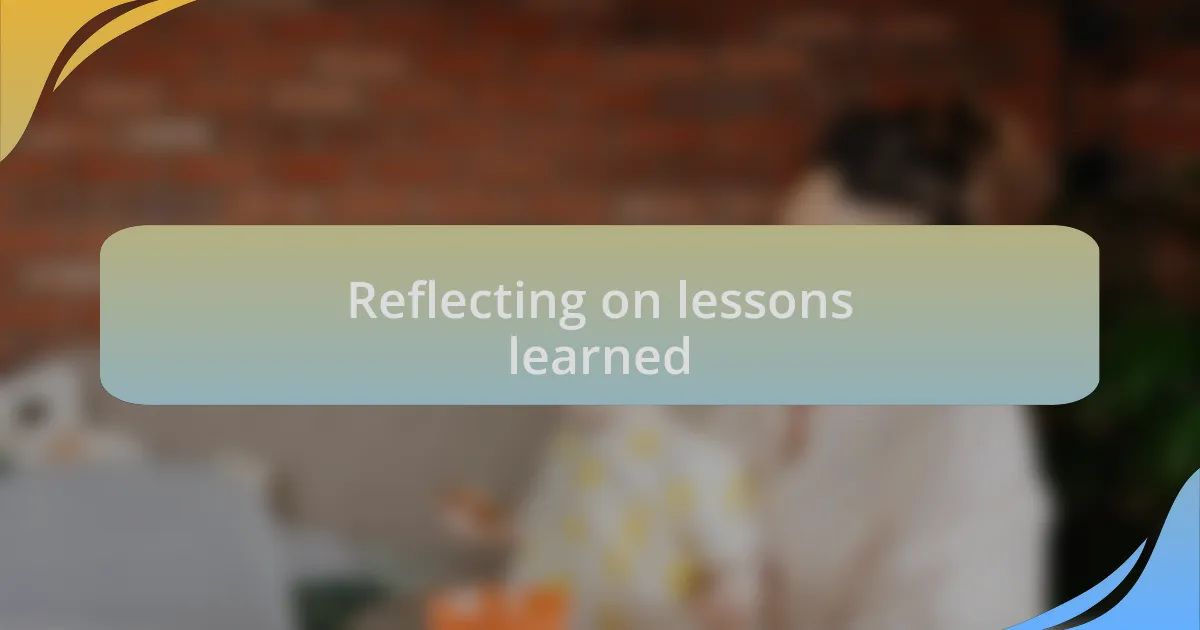
Reflecting on lessons learned
When I reflect on my volunteer work, one lesson stands out: the power of empathy. There was a moment during a food distribution when a young mother approached me, her eyes filled with worry, asking where she could find help for her children. That moment reminded me that beyond logistics and resources, it’s the human connections that truly matter. How often do we overlook the emotional side of crisis management?
I’ve also gained a better understanding of adaptability. At one event, we faced an unexpected surge of people needing assistance. Instead of faltering, our team quickly brainstormed ways to reorganize our approach. That day reinforced my belief that flexibility is key in high-pressure situations. I wonder how many organizations incorporate adaptability training to better prepare their teams for the unpredictable nature of emergencies.
Finally, my experiences taught me the importance of proactive engagement. After a particularly challenging outreach event, I realized that simply responding to crises isn’t enough; communities need to be educated on prevention strategies. Could more training opportunities lead to a more informed public? This realization transformed my perspective and fueled my desire to advocate for community-based training programs.